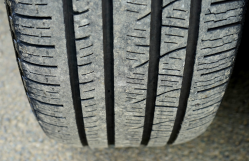— Continental Tire has won a lawsuit that alleges the death of a man from a 2011 accident was really the fault of a Continental tire installed on a van in a different crash that occurred six years earlier.
In September 2005, Alex Novak, then 81, was a passenger in a 1988 Chevrolet van that hit a power pole in Fremont, California. Novak claimed the crash occurred because the van was equipped with a “General Road Tamer LX” tire manufactured in 1993 by Continental’s predecessor.
Novak claimed the tire blew out and caused the driver to crash, so he sued Continental Tire by claiming the company failed to warn the driver that old tires degrade over time.
Novak claimed the tire company should have told the van driver that old tires should be replaced even if the tread depth is still good.
Continental won the case, but Novak appealed and while the case was still on appeal, Mr. Novak died at age 87 after a three-wheel motorized scooter he was driving collided with a 1997 Toyota Corolla in 2011. Police determined the driver of the Corolla was at fault.
This caused a second lawsuit to be filed against Continental Tire by Mr. Novak's daughter, Paula Novak.
In the wrongful death lawsuit, she uses the following "reasoning" to base her claims:
- Her father was injured in a 2005 crash of a van equipped with a Continental tire that allegedly blew out.
- The injuries caused Mr. Novak to use a scooter to get around because of his impaired mobility.
- Because of having to ride a scooter, Mr. Novak was involved in a 2011 crash between his scooter and another vehicle.
- Mr. Novak's death eight days later was caused by his use of the scooter.
- He wouldn't have been riding a scooter if the van wouldn't have crashed six years earlier.
- The 2005 van crash wouldn't have occurred if Continental would have warned the van driver that old tires degrade over time.
- Therefore, Continental is responsible for her father's death.
In addition to filing suit against Continental Tire, Novak also sued an auto mechanic who allegedly should have provided warnings that old rubber tires lose “resiliency” with age.
The trial court ruled in favor of Continental by saying the evidence against the company was "insufficient to establish a causal link between defendants’ [Continentals'] conduct alleged to have caused one traffic accident and decedent’s death years later following a separate traffic accident."
Novak appealed to the 1st Appellate District Court of California which affirmed the previous judgment in favor of Continental and the mechanic. The appeals court ruled the scooter crash was a separate issue from the van crash six years earlier and no causal link existed between the two incidents.
"The vehicle-scooter accident operated independently of any situation created by defendants’ alleged negligence and was due to the superseding cause of a motorist’s wrongful failure to yield when entering a crosswalk."
The Continental tire lawsuit is Paula Novak v. Continental Tire North America, et al.

